Editor’s note: This Q&A article has been edited for clarity and brevity.
Julie Griffith, the most recent member to join Ball State’s Board of Trustees after her appointment by Gov. Eric Holcomb, likes to tell people she “was raised on the sunny side of the Ohio River in Indiana.”
Griffith currently serves as the Executive Vice President for Strategy, Partnerships and Outreach for the Indiana Innovation Institute. A 1979 Ball State political science alumna, she is a member of the Ball State Foundation board and the Dean’s Advisory Council for the College of Sciences and Humanities.
Griffith spoke with The Daily News to discuss her role as a trustee and her time at Ball State.
Q: Can you tell me a little bit about yourself?
A: I grew up in a small town [called Scottsburg] in southeastern Indiana. As my brothers and I often say, we hit the parent jackpot because we had great, incredible parents. [I have] two brothers that I talk to every day, still. We had the typical experience of a small town … I was involved in all the high school activities and just had a wonderful upbringing there.
Q: What drew you to come to Ball State for college?
A: I visited other places, and it was a different experience then than it is now. But this place felt like home to me. It was comfortable for me. I love the culture. I knew I'd get a great education here, and I did. It was just the right fit for me and, again, when I came here, I think I grew up in a town of 3,500 people and Ball State had 15,000 at the time, so it’s five times the size of my hometown. It was a little overwhelming, but I always felt welcomed here. I always felt like I had the right kind of support if I needed it. It just kind of felt like home. The other places were lovely, but this was a place for me. It was very clear very early on.
Q: At the various institutes you’ve served, what were some of your professional responsibilities and projects?
A: I typically worked in really big organizations, and now, I work for a startup. That's been a wonderful experience for me. When I started, we were really a year old — I think I was the fourth person hired. We all do a lot of different things and rely on each other for a lot of things — you can do that at those other places too, but you always have other resources at the ready if you need them if you're in a large organization.
I would say, on the legislative front, when I was a lobbyist and did government and regulatory affairs for Duke Energy, we passed some pretty significant pieces of legislation I think were helpful to the company. Those were really fun, and it's not just getting those things done, it's the process that's so important — the teamwork that it takes not only internally, but externally to make those things happen.
Then when I was at Purdue [University], I had a pretty broad portfolio. My title was vice president for public affairs, but the way I kind of explained it to other people is that public affairs was kind of all the external-facing things the university does. When the [vice president] for marketing communications left, that got combined under what became public affairs. So melding those two organizations [and] raising the profile of the institution was a lot of work and a lot of fun. [It was] very rewarding. Trying to put those things together and advance the mission of the institution and raise the profile was something that a lot of us worked together to do, and I think we were successful in doing it.
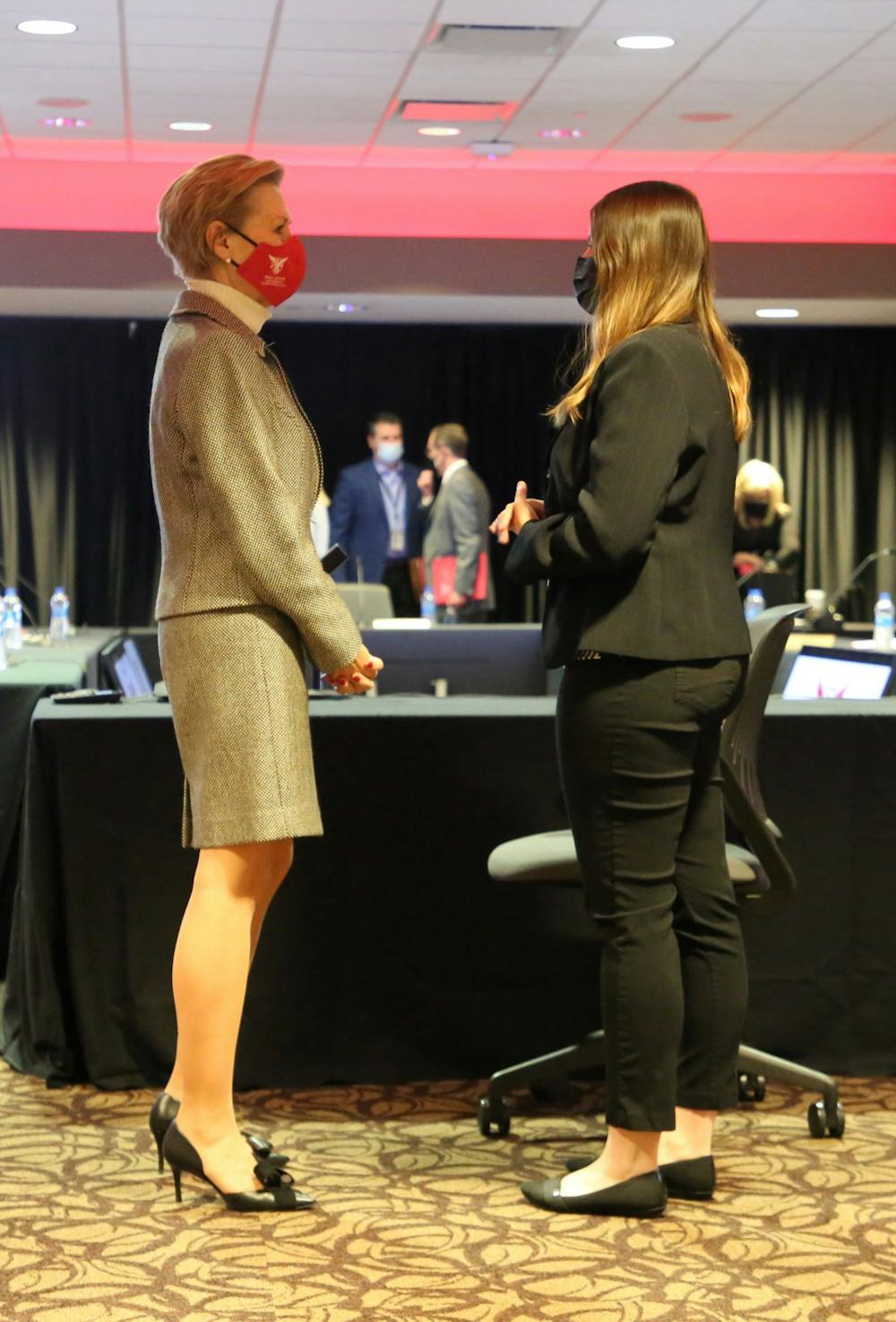
Julie Griffith, new Board of Trustees member, speaks with student trustee Amy Wyse after the Board of Trustees meeting Jan. 28, 2022, in the L.A Pittenger Student Center. Indiana Gov. Eric Holcomb appointed Wyse to the Board of Trustees in June 2021 and Griffith to the board in November 2021. Hannah Amos, DN
Q: Can you briefly describe the process of being appointed to the Ball State Board of Trustees?
A: The process is really done solely within the governor’s office — they do their own internal vetting process and I honestly can’t speak to how the governor’s office does those things. But I had just finished serving over the last three years on the Indiana Commission on Judicial Qualifications, which is a gubernatorial appointment. I got a call one [November 2021] afternoon and one gentleman from the governor's office called and said, ‘Hey, just wanted to thank you so much for your service on the commission.’ And I said, ‘Well, I was delighted to do it. I learned so much and I was really grateful to have that opportunity.’ And he said, ‘We’re glad you like public service because we have another role for you if you consider it.’ I was surprised and delighted. I am so delighted to be able to serve the university who has served me so well for so many years. I am so looking forward to the opportunity.
Q: What types of activities were you involved in as a student?
A: Two things really stand out for me in terms of things that were really formative to me, and one is something that doesn't exist anymore — it was called the London Center program. We were on the quarter system then, and there were somewhere between 20 and 30 of us that spent a quarter in London. To be able to travel across Europe with those kinds of friends and learn so much about the cultures of other countries — to have that kind of experience — just really changed me in a good way.
The other thing I did my senior year that really shaped me, in addition to all the other things you do as an undergraduate, is the internship program that I did through the [Department of Political Science]. I did an internship in the state Senate that started in December, and then we went through the end of that session, so that was a long year. It ended in April, which really kind of changed the trajectory of what I thought I might do in my career over time, and I still have some really close friends that were also participating in that program that I still stay in touch with.
Q: What inspired you to join the Foundation board and Dean's Advisory Council for the College of Sciences and Humanities? What are some of your responsibilities in that role?
A: I've been on the Dean's Advisory Council for a while. Michael Maggiotto was the dean when I first joined and now it's Maureen McCarthy, who's awesome. They both are incredible. I was asked to join, and I try to join only those things I know I really am passionate about and want and have the time to do.
I think I've served on the Foundation Board for four years. I was the chair of the Engagement Philanthropy Committee, so there's a lot that goes into all the work of the foundation, but one of the things that's been the most fun for me, is as you seek support for the institution, I get to talk to a lot of alums about support for the institution and they are so excited about the direction of the university. So, when you get to have conversations like that, and you think you're helping advance the mission of the university by your work on the foundation, it's really rewarding to get to do that. When you get to do that, it's certainly not work, it's just something you have the pleasure of getting to do.
Q: When you graduated from Ball State, did you think you would return in any role?
A: I knew I would be involved in some way. I just didn't know how. Even when I lived in Houston for a while, I stayed engaged on the alumni level. If you would have asked me on graduation day, ‘Are you going to be involved in the Ball State Bold campaign, or if you're going to be involved with the Bowen Center — if you're going to be involved in whatever?’ I'm sure I didn't envision that because I didn't know what opportunities there were before me at the time, but I knew I'd stay engaged somehow. I've been engaged in some form or fashion literally since I graduated.
Q: What type of impact would you like to leave on the Ball State community?
A: I don't think of it in terms of individual impact because I think, in life, pretty much everything you do is a team sport. There are several other members of the Board of Trustees and the incredible leadership team that President Mearns has put together, so, whatever impact I may have would be part of that team.
I don't know that Ball State's ever been in a better position than it is today or had a brighter future than we've ever had, so I am truly excited to be part of the board and to get to work with everybody and frankly, getting to know students too — that's why we're here is to advance the mission of the university. I look at my involvement as a collective impact, not individual.
Contact Grace Mccormick with comments at grmccormick@bsu.edu or on Twitter @graceMc564.

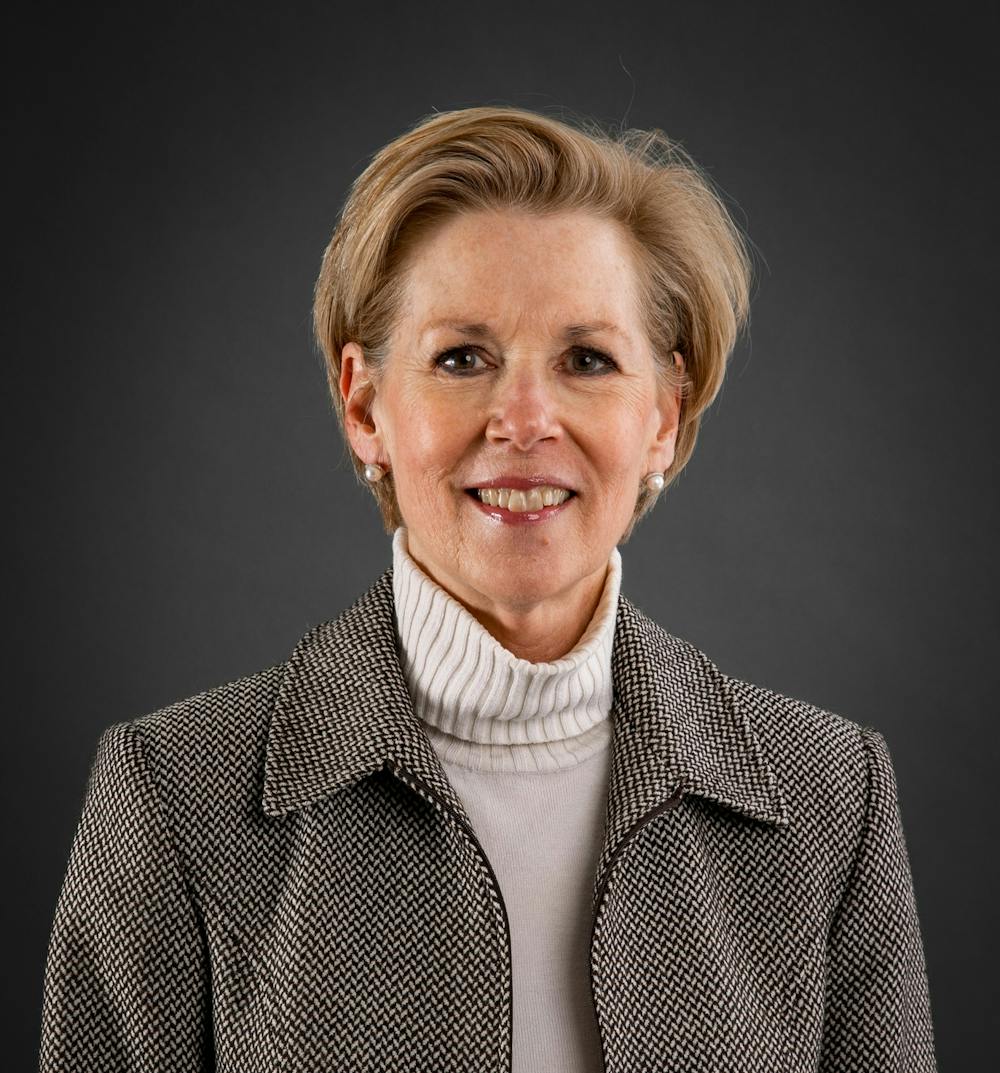
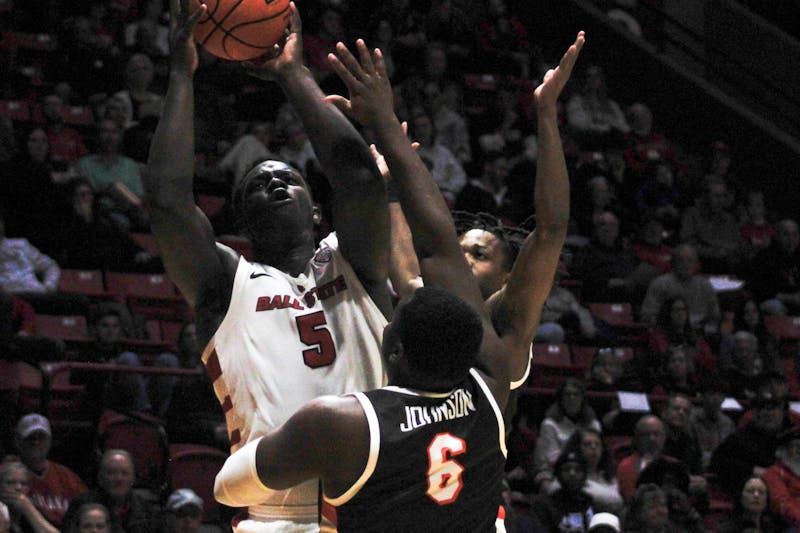
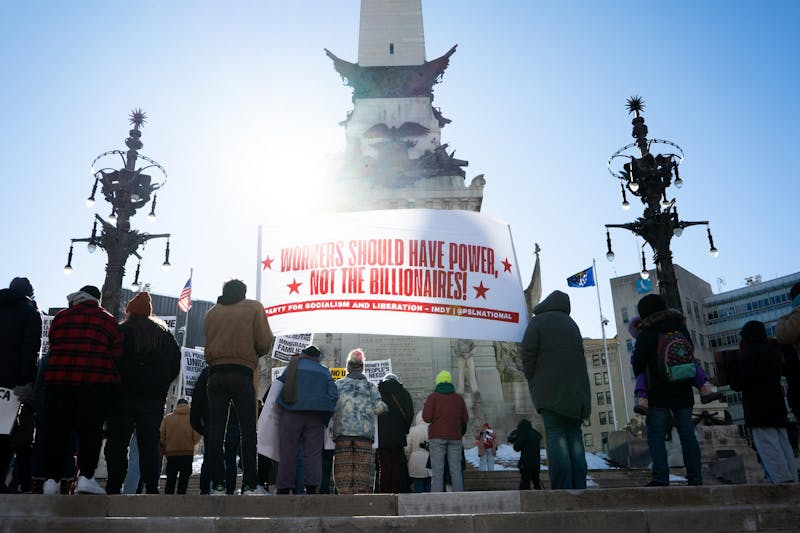
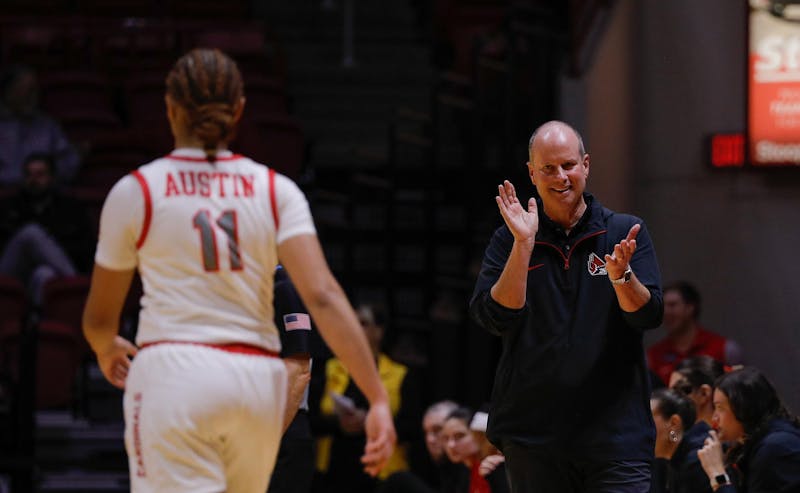
The Daily News welcomes thoughtful discussion on all of our stories, but please keep comments civil and on-topic. Read our full guidelines here.